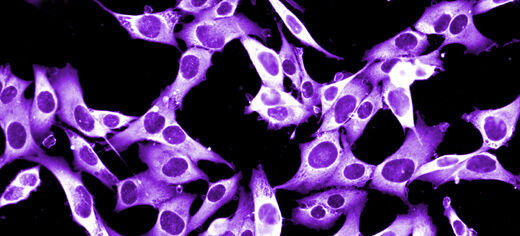
Scientists at Leeds have found that the immune system's behaviour can act as an early warning alarm that detects cancer recurrence, and this could offer a chance for pre-emptive treatment.
When cancers go into remission, small groups of cells sometimes hide away, lying dormant until they reawaken and grow once more.
Oncologists at the University, Leeds Teaching Hospitals and The Institute of Cancer Research, London, working with colleagues at the Mayo Clinic in the US, found that this reawakening of the cancer after treatment occurs because the disease has evolved to evade the immune system which – until that point – had kept it under control.
The Cancer Research UK-funded study, in mice, involved researchers looking for early signs of the immune response ‘kicking in’ indicating that the cancer was once more active. This allowed them to predict accurately when the cancer was about to return.
Professor Alan Melcher, a Cancer Research UK senior clinical research fellow at the University of Leeds, said: “The ability to predict when a patient’s cancer will come back would be an invaluable tool in treating the disease, allowing doctors to treat the recurrence rapidly and effectively before it takes hold. But we now need to find a way of using this knowledge to develop a test for patients whose cancer could take several years to reappear.”
Intriguingly, the scientists found they could deliberately reawaken the cancer cells, before they have evolved the ability to evade the immune system, and then use the mice’s own defences to track down and kill the remaining cancer cells. In the study, this approach cured up to 100 per cent of the mice that would otherwise have relapsed.
Researchers believe that this could possibly lead to a change in how cancers are treated, by waking them back up before they’re ready to beat the immune system. But this would need highly effective monitoring and failsafe treatments, which are not yet widely available for most cancers in a clinic. Current approaches are limited to having to wait until the cancer reappears, by which time it has sometimes evolved to evade common treatments.
Professor Kevin Harrington, Joint Head of the Division of Radiotherapy and Imaging at The Institute of Cancer Research, London, and Honorary Consultant Clinical Oncologist at The Royal Marsden NHS Foundation Trust, said: “This approach to reawakening the cancer deliberately may seem controversial, but a similar approach is already used in some patients with thyroid cancers. They are given thyroid stimulating hormone to reveal any hidden tumours so that they can be treated with further radio-iodide therapy.
“This illustrates the potential of a general clinical approach to flushing out any remaining cancer cells and treating them while they are still vulnerable, with the aim of curing the disease.”
Nell Barrie, Senior Science Information Manager at Cancer Research UK, said: “Better treatments for cancer have meant that today more than half of all patients with the disease survive. But many have to live with the uncertainty that their cancer could one day come back. This approach to rooting out cancer cells that have hidden away and pre-emptively striking them is very promising and we now need to develop ways of doing this in cancer patients.”
Results of the study are published in Nature Medicine.
Further information
*Kottke, T. Et al., “Tumor relapse can be detected and cured by targeting a phenotype of resistance to innate immune effectors during early recurrence.” Nature Medicine (2013)
For media enquiries contact Simon Shears in the Cancer Research UK press office on 020 3469 8054 or, out of hours, on 07050 264 059.